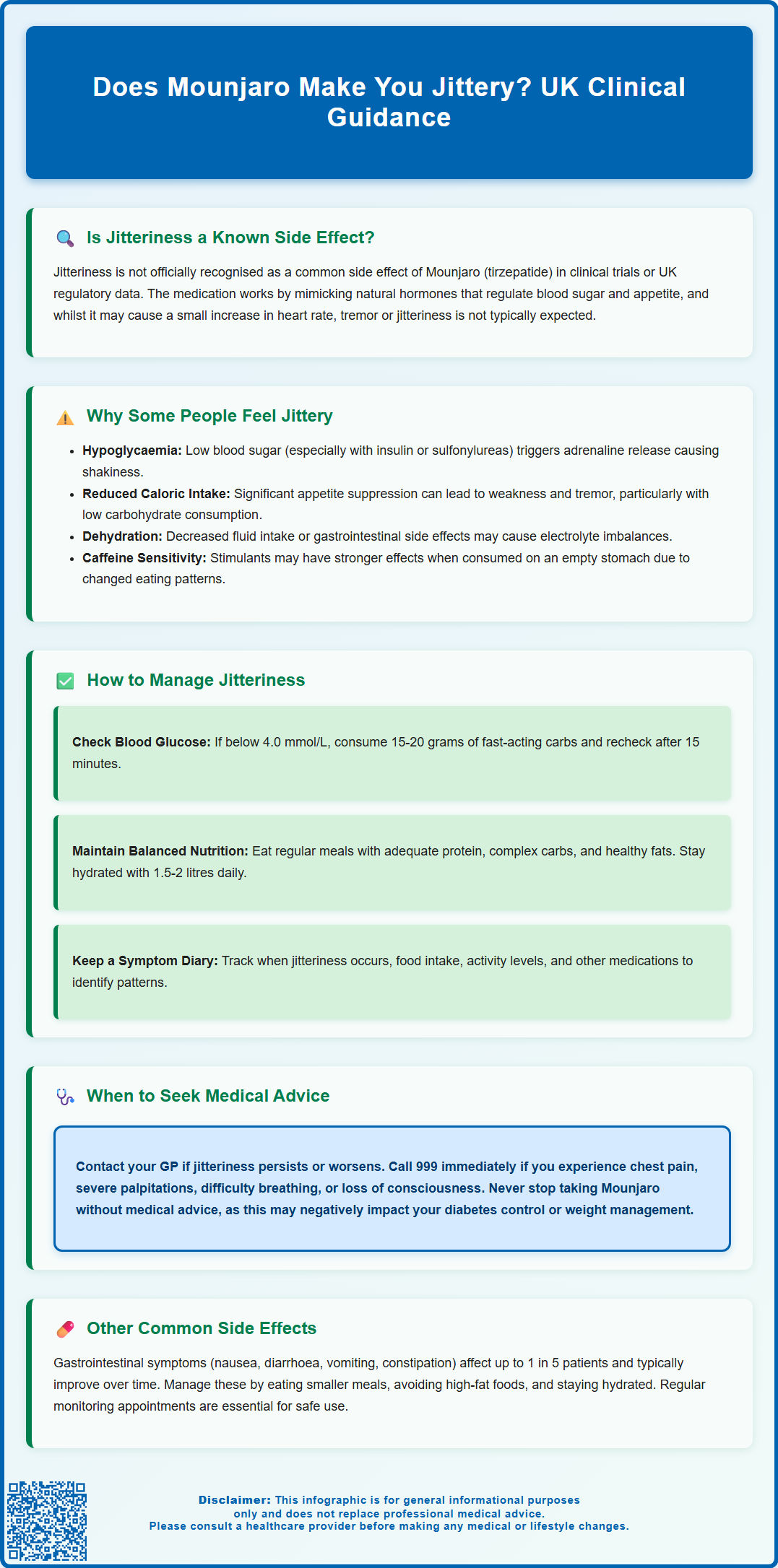Does Mounjaro make you jittery? Jitteriness is not a commonly reported side effect of Mounjaro (tirzepatide), a dual GLP-1 and GIP receptor agonist licensed in the UK for type 2 diabetes and weight management. Whilst clinical trial data and the MHRA-approved Summary of Product Characteristics do not list jitteriness or tremor as recognised adverse reactions, some patients report feeling shaky or anxious during treatment. These sensations may relate to indirect factors such as low blood sugar, reduced caloric intake, or changes in eating patterns. If you experience jitteriness whilst taking Mounjaro, discuss this with your GP or prescribing clinician to identify the cause and determine appropriate management.
Summary: Jitteriness is not a recognised side effect of Mounjaro (tirzepatide) according to UK regulatory data, though some patients report shakiness due to indirect factors such as low blood sugar or reduced food intake.
- Tirzepatide is a dual GLP-1 and GIP receptor agonist licensed in the UK for type 2 diabetes and weight management.
- Jitteriness may result from hypoglycaemia, particularly when Mounjaro is combined with insulin or sulfonylureas.
- Reduced caloric intake, dehydration, or anxiety related to treatment may contribute to feelings of shakiness.
- Check blood glucose levels if jitteriness occurs; treat hypoglycaemia with 15–20 grams of fast-acting carbohydrate if below 4.0 mmol/L.
- Discuss persistent or severe symptoms with your GP; do not stop Mounjaro without medical advice.
- Report suspected side effects through the MHRA Yellow Card Scheme.
Table of Contents
Does Mounjaro Make You Jittery?
Jitteriness is not a commonly reported side effect of Mounjaro (tirzepatide), according to clinical trial data and the Summary of Product Characteristics (SmPC) approved by the Medicines and Healthcare products Regulatory Agency (MHRA). Mounjaro is a glucagon-like peptide-1 (GLP-1) receptor agonist and glucose-dependent insulinotropic polypeptide (GIP) receptor agonist licensed in the UK for treating type 2 diabetes, with weight management indications also approved.
The medication works by mimicking natural hormones that regulate blood sugar levels and appetite, slowing gastric emptying and enhancing insulin secretion when glucose levels are elevated. While GLP-1/GIP agonists like tirzepatide can cause a small increase in heart rate in some patients, jitteriness or tremor is not listed as a recognised adverse reaction in the official product information.
Some patients have anecdotally reported feeling anxious, shaky, or jittery whilst taking the medication. Individual responses to any medication can vary considerably, and indirect factors related to Mounjaro's effects on metabolism, blood glucose, and eating patterns may contribute to these sensations in certain individuals.
If you are experiencing jitteriness or tremor whilst taking Mounjaro, it is important to discuss this with your GP or prescribing clinician. They can assess whether the symptom is related to the medication, investigate other potential causes, and determine whether any adjustments to your treatment plan are necessary. Do not stop taking Mounjaro without medical advice, as abrupt discontinuation may affect your diabetes control or weight management progress.
Why Some People Feel Jittery on Mounjaro
Although jitteriness is not a recognised adverse effect of tirzepatide, several indirect mechanisms may explain why some individuals experience these sensations. The most common reason is hypoglycaemia (low blood sugar), particularly in patients taking Mounjaro alongside other glucose-lowering medications such as sulfonylureas or insulin. When blood glucose drops below normal levels (typically below 4.0 mmol/L), the body releases adrenaline as a counter-regulatory response, which can cause tremor, sweating, palpitations, and a jittery feeling. Mounjaro itself carries a low intrinsic risk of hypoglycaemia when used alone due to its glucose-dependent mechanism, but the risk increases substantially when combined with insulin or sulfonylureas.
Reduced caloric intake is another potential contributor. Mounjaro significantly suppresses appetite and slows gastric emptying, leading many patients to consume considerably fewer calories than before treatment. Inadequate energy intake, particularly if carbohydrate consumption is very low, may result in feelings of weakness, shakiness, or light-headedness that patients may interpret as jitteriness. Dehydration and electrolyte imbalances, which can occur secondary to reduced food and fluid intake or gastrointestinal side effects such as nausea and vomiting, may also contribute to these sensations.
Anxiety related to medication use or weight changes should not be overlooked. Some patients experience heightened anxiety about potential side effects, changes in body composition, or the medication's effects, which can manifest as physical symptoms including tremor and restlessness. Caffeine consumption, particularly on an empty stomach, may also be more noticeable in patients whose eating patterns have changed significantly on Mounjaro. Additionally, other stimulants or over-the-counter decongestants can contribute to feelings of jitteriness if taken concurrently.

How to Manage Jitteriness While Taking Mounjaro
If you experience jitteriness whilst taking Mounjaro, the first step is to check your blood glucose levels if you have access to a glucose meter. If your reading is below 4.0 mmol/L, treat the hypoglycaemia immediately with 15–20 grams of fast-acting carbohydrate (such as glucose tablets, fruit juice, or sugary sweets), then recheck after 15 minutes. If your next meal is more than an hour away, follow with a longer-acting carbohydrate snack such as a sandwich or piece of fruit. Contact your GP or diabetes specialist nurse to discuss adjusting the doses of any other diabetes medications you are taking, as dose reductions may be necessary to prevent recurrent hypoglycaemia.
Ensure adequate nutritional intake even if your appetite is suppressed. Aim to consume regular, balanced meals containing sufficient protein, complex carbohydrates, and healthy fats. Eating small, frequent meals rather than one or two large meals may help maintain stable blood glucose levels and energy throughout the day. Stay well hydrated by drinking plenty of fluids daily (typically 1.5–2 litres, though people with heart failure or kidney disease should follow their clinician's individualised advice). Consider reducing caffeine intake, particularly if you notice symptoms worsen after coffee or energy drinks.
Monitor your symptoms carefully and keep a diary noting when jitteriness occurs, what you have eaten, your activity level, and any other medications or supplements you are taking. This information will be valuable for your healthcare provider in identifying patterns or triggers. If jitteriness is accompanied by chest pain, severe palpitations, difficulty breathing, or loss of consciousness, seek immediate medical attention by calling 999 or attending A&E.
Your GP may recommend blood tests to check thyroid function and electrolyte levels, and possibly vitamin B12 status (particularly if you also take metformin), as deficiencies or imbalances in these areas can contribute to neurological symptoms. In some cases, adjusting the Mounjaro dose or temporarily pausing treatment may be appropriate whilst investigations are completed. Never adjust your dose or stop treatment without consulting your prescriber, as this may compromise your diabetes control or weight management outcomes.
If you suspect your symptoms are a side effect of Mounjaro, you can report this through the MHRA Yellow Card Scheme (yellowcard.mhra.gov.uk).
Other Common Side Effects of Mounjaro in the UK
Gastrointestinal symptoms are the most frequently reported adverse effects of Mounjaro in UK clinical practice, consistent with the mechanism of action of GLP-1 receptor agonists. These include:
-
Nausea (affecting up to 1 in 5 patients) – usually most pronounced during dose escalation and often improves over time
-
Diarrhoea – may be mild to moderate and typically transient
-
Vomiting – less common than nausea but can occur, particularly in the first few weeks
-
Constipation – resulting from slowed gastric emptying
-
Abdominal pain and bloating – often related to delayed gastric emptying
-
Reduced appetite – this is an intended therapeutic effect but can be pronounced
The frequency of these side effects tends to be dose-dependent, with higher rates at higher doses. To minimise gastrointestinal side effects, the SmPC recommends gradual dose escalation. NHS advice includes eating smaller meals, avoiding high-fat foods, and staying well hydrated. If vomiting or diarrhoea is severe or persistent, contact your GP, as this may lead to dehydration and require temporary treatment interruption.
Injection site reactions such as redness, itching, or mild swelling occur in some patients but are usually mild and resolve spontaneously. Rotating injection sites (abdomen, thigh, or upper arm) can help minimise these reactions. Fatigue and dizziness have been reported, possibly related to reduced caloric intake or changes in blood pressure.
Serious but rare adverse effects require immediate medical attention and include:
-
Pancreatitis – severe, persistent abdominal pain radiating to the back, often with nausea and vomiting. If pancreatitis is suspected, stop tirzepatide and seek urgent medical care.
-
Gallbladder problems – right upper abdominal pain, particularly after eating fatty foods
-
Severe allergic reactions – rash, swelling of face or throat, difficulty breathing
-
Diabetic retinopathy complications – sudden vision changes (in patients with pre-existing retinopathy)
-
Acute kidney injury – particularly in the context of severe dehydration
The MHRA advises that patients should be counselled about these risks before starting treatment. If you experience severe or persistent side effects, contact your GP or NHS 111 for advice. Regular monitoring and follow-up appointments are essential to ensure safe and effective use of Mounjaro in accordance with UK prescribing guidelines.
Frequently Asked Questions
Can Mounjaro cause low blood sugar and jitteriness?
Mounjaro has a low intrinsic risk of hypoglycaemia when used alone, but the risk increases substantially when combined with insulin or sulfonylureas. Low blood sugar can cause jitteriness, tremor, and sweating due to adrenaline release.
What should I do if I feel jittery whilst taking Mounjaro?
Check your blood glucose levels if possible, ensure adequate food and fluid intake, and contact your GP to discuss symptoms. Do not stop Mounjaro without medical advice, as this may affect your diabetes control or weight management.
Are there other side effects of Mounjaro I should know about?
The most common side effects are gastrointestinal, including nausea, diarrhoea, vomiting, and constipation. Rare but serious effects include pancreatitis, gallbladder problems, and severe allergic reactions, which require immediate medical attention.
The health-related content published on this site is based on credible scientific sources and is periodically reviewed to ensure accuracy and relevance. Although we aim to reflect the most current medical knowledge, the material is meant for general education and awareness only.
The information on this site is not a substitute for professional medical advice. For any health concerns, please speak with a qualified medical professional. By using this information, you acknowledge responsibility for any decisions made and understand we are not liable for any consequences that may result.
Heading 1
Heading 2
Heading 3
Heading 4
Heading 5
Heading 6
Lorem ipsum dolor sit amet, consectetur adipiscing elit, sed do eiusmod tempor incididunt ut labore et dolore magna aliqua. Ut enim ad minim veniam, quis nostrud exercitation ullamco laboris nisi ut aliquip ex ea commodo consequat. Duis aute irure dolor in reprehenderit in voluptate velit esse cillum dolore eu fugiat nulla pariatur.
Block quote
Ordered list
- Item 1
- Item 2
- Item 3
Unordered list
- Item A
- Item B
- Item C
Bold text
Emphasis
Superscript
Subscript












